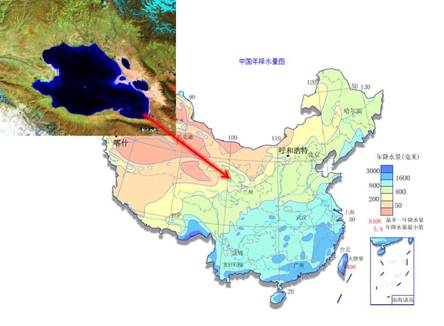Qinghai Lake, located at the Northeast of the Qinghai-Tibet Plateau, is the largest arctic-alpine semi-arid zone inland saltwater lake of China. The basin, with total area of 29661.0 km2 and lake surface area of 4206 km2 (in 2005), is also a key area in Recovering and Rebuilding of Ecological System Functions in Ecologically Fragile Region as preferential subject in environmental field in the Outline of National Plan for Medium to Long-term Scientific and Technological Development(2006-2020). Over the past 50 years, due to global climate warming and increasing human and animal loads, ecological and environmental problems such as lake shrinkage, grassland degradation, land desertification and reduction of bio-diversity become increasingly serious, badly influencing ecological safety and sustainable development of economy and society in the region.
Ecological and environmental problems in Qinghai Lake area have caused serious concern to the Central Government, local government, international community and scientists. The Chinese Government has in succession carried out some engineering treatment of Qinghai Lake basin and surrounding ecological environment by conducting natural forest protection project, “Three-north” shelter forest project, return-farmland-to-forest project, wild animal and plant protection project and natural reserve construction project, and launching grassland infrastructure construction and protection and treatment with rat destruction and insect killing, grassland improvement, artificial grass planting, animal shed construction, herdsmen settlement as main content, partially improving ecological environment in Qinghai Lake basin and surrounding area. But the general deterioration of ecological environment such as lowering Qinghai Lake water level, expanding desertification area, ongoing destruction of the vegetation, degrading grassland and decreasing fish resources, etc has not been staved off fundamentally.
Moreover, modern meteorological observation records show that in Qinghai Lake area average temperature rise in recent 30 years is 0.5℃/10, obviously higher than global temperature rise (0.03~0.06℃/10 per year), showing Qinghai Lake basin is one of areas with very striking temperature rise in the world. In accordance with the 4th evaluation report released by IPCC recently, it can be forecast that in 2100 global average temperature may rise by 1.8 to 4℃ compared with that at the end of the 20th century. Under the situations, temperature increase in Qinghai Lake area will be higher, and the impact of global warming on ecological system and environment in the region will be more striking.

Therefore, considering the trend of global warming and aggravating human activities in Qinghai Lake basin, it will be of great significance on the national demand of promoting ecological safety, economic development and harmonious co-existence of human and nature in Qinghai Lake basin to carry out research and pilot demonstration of ecological and environmental treatment techniques. At the same time, the treatment will not only be of regional significance, but also of typical demonstration significance on ecological treatment in arctic-alpine semi-arid areas in China, Asia even in the world.
 © 2015 Institute of Earth Environment,CAS
© 2015 Institute of Earth Environment,CAS Address:No. 97 Yanxiang Road, Xi'an 710061, Shaanxi, China

 Location :
Location :